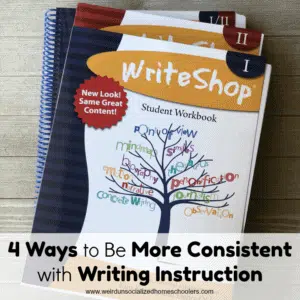5 Practical Ways to Help Your Homeschooler Write Better
Are you a homeschool mom struggling to help your child become a better writer? It’s not as hard as you think. Try Bethany’s tips to help your homeschooler write better.
Want to know a secret? Writing is a subject that many homeschool parents dread as much as their children do. While kids are groaning, “Why do I have to write?” their parents are lamenting, “How do I teach writing?”
So many questions and arguments arise as we struggle to help our homeschooler write better.
What’s a homeschool parent to do?

It’s not as mysterious as it seems. Just a few recommendations will help you lead your student to improved writing without tears and a red pen. As a bonus, these ideas work with any curriculum. So don’t think you need to buy something new. You can implement these tips today with what you have.
Encounter Big Ideas
Writing is, most importantly, about the expression of ideas. Whether it is a poem, short story, or five-paragraph essay, the top priority is expressing thoughts and ideas clearly. And while this may seem counter-intuitive, one of the first steps to writing well is reading broadly.
How can a child learn to write well if they rarely hear well-written prose? From the earliest age, children should be hearing and reading good books that use rich language. Reading helps to increase their vocabulary and making them comfortable with complex sentences.
It also gives them the experience with story structure and learning how an author leads the reader through the tale. Kids can listen to how the chosen words paint a picture that shows rather than tells.
While challenging to teach directly, hearing good books will help children internalize writing skills in ways impossible with a worksheet.
Be Your Student’s Scribe
Young children are often full of interesting ideas and exciting stories but find it difficult to transfer those ideas to paper. Plus, a young child knows many more words than he can spell. Why limit children to what they can spell and their endurance holding a pencil.
Even when you write down their story for them, they are still composing. So be your child’s scribe and allow them to formulate complex thoughts without being limited by their academic abilities.
Many authors used dictation, from John Milton to Dan Brown, because even with their advanced skills, they can still speak their words and ideas faster than they can type or write. If it’s good enough for Winston Churchill, it’s probably okay for your homeschooler.
Transition to the Academic
Once your child is excited about words and their ability to express thoughts and ideas, it’s time to start giving them the tools needed for competent, independent writing. Now they can begin to learn all the technical aspects of writing such as grammar, usage, mechanics, and punctuation.
As they write for themselves, they can practice different ways of expressing ideas through writing. It is also time to begin the formal process of taking a written piece from a rough draft to completed work. Knowing how to revise, edit, and proofread are needed skills that will help your homeschoolers write better.
Embrace Technology
There will always be children who struggle with spelling and mechanics, no matter how many spelling tests and grammar worksheets they complete. However, with the technology available today, this doesn’t need to limit their ability to write.
My child that struggles with dyslexia can use speech-to-text to help get her thoughts out much more quickly than she could type. Web-based spelling and grammar checks allow her to find the errors she doesn’t catch. Children can also use online dictionaries and thesauri to broaden their vocabulary and rid their writing of unnecessary words.

Be Their Coach, Not Their Critic
Homeschoolers have the luxury of continually refining written work without the time pressures of a due date. Therefore, be their coach, and help them find their errors, suggest phrasing that would be better understood, and make style recommendations.
Partnering with your child in this manner will do more to improve their writing skills than merely receiving a grade. Not to mention, excessive use of the dreaded red pen is one of the biggest mistakes parents make when teaching writing.
Give Your Writer the Gift of Time
Lastly, be patient and give your students plenty of time. So many homeschool parents worry when their nine-year-old balks at writing. Why is this surprising? They’ve only recently mastered holding a pencil and forming letters.
Asking a young child to use excellent penmanship, spelling, and grammar skills, all while composing original thoughts, is a tall order. Don’t think because they can’t churn out book reports in fifth grade that their writing future is doomed.
It isn’t. There is time. And with you as a guide, your homeschooler’s ability to produce eloquently written communication will flourish.
What is your biggest hurdle when it comes to teaching your child writing?






